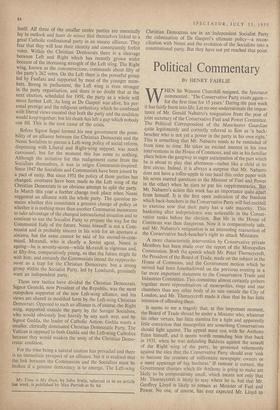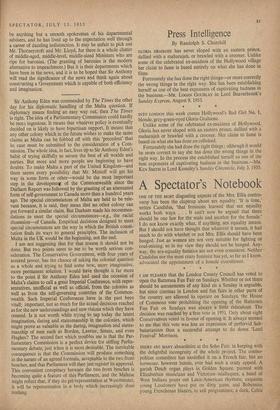Political Commentary
BY HENRY FAIRLIE WHEN Sir Winston Churchill resigned, the Spectator commented : 'The Conservative Party exists again— for the first time for 15 years.' During the past week it has fairly burst into life. Let no one underestimate the impor- tance of Mr. Gerald Nabarro's resignation from the post of joint secretary of the Conservative Fuel and Power Committee. The Political Correspondent of the Manchester Guardian quite legitimately and correctly referred to Aim as 'a back- bencher who is not yet a power in the party in his own right.' This is something that Mr. Nabarro needs to be reminded of from time to time. He takes an excited interest in his own interventions in the House of Commons, and sits in his familiar place below the gangway in eager anticipation of the part which he is about to play that afternoon—rather like a child at its first circus. Indeed, it is always a surprise that Mr. Nabarro does not have a toffee-apple in one hand (his order paper with his seven starred questions to the Minister of Fuel and Power in the other) when he rises to put his supplementaries, But Mr. Nabarro's action this week has an importance quite apart from himself. It is the first open indication of the freedom which back-benchers in the Conservative Party will feel entitled to exercise now that their party has a safe majority. This hankering after independence was noticeable in the Conser- vative ranks before the election. But life in the House of Commons was then dangerous. Now it is comparatively safe, and Mr. Nabarro's resignation is an interesting reassertion of the Conservative back-bencher's right to attack Ministers.
A more characteristic intervention by Conservative private Members has been made over the report of the Monopolies Commission. Both the speech which • Mr. Peter Thorneycroft, the President of the Board of Trade, made on the subject in the House of Commons, and the Government motion which he moved had been foreshadowed on the previous evening in a far more important statement to the Conservative Trade and Industries Committee. This committee almost certainly gathers `together more represehtatives of monopolies, rings and star chambers than any other body of its size outside the City of London, and Mr. Thorneycroft made it clear that he has little intention of offending them.
It seems to me a tragedy that, at this important moment, the Board of Trade should be under a Minister who, whatever his other virtues, has little stamina for a fight and apparently little conviction that monopolies are something Conservatives should fight against. The appeal must rest with Sir Anthony Eden himself, and it seems worth reminding him that back in 1931, when he was defending Baldwin against the assault of the Right wing of the party, he protested vehemently against the idea that the. Conservative Party should ever 'sink to become the creature of millionaire newspaper owners or a mere appanage of big business.' If rumour is correct, the Government changes which Sir Anthony is going to make are likely to be comparatively small, which means not only that Mr. Thorneycroft is likely to stay where he is, but that Mr. Geoffrey Lloyd is likely to remain as Minister of Fuel and Power. No one, of course, has ever expected Mr. Lloyd to be anything but a smooth spokesman of his departmental advisers, and he has lived up to the expectation well through a career of dazzling indistinction. It may be unfair to pick out Mr. Thorneycroft and Mr. Lloyd, for there is a whole clutter of middle-aged, middle-level, middle-sized Ministers who are ripe for baronies. (The granting of baronies is the modern alternative to impeachment.) But it is their departments which have been in the news, and it is to be hoped that Sir Anthony will read the significance of the news and think again about constructing a Government which is capable of both efficiency and imagination.
Sir Anthony Eden was commended by The Times the other day for his diplomatic handling of the Malta question. If diplomacy means finding an easy way out, then The Times is right. The idea of a Parliamentary Commission could hardly be mote ingenious. It means that whatever policy is eventually decided on is likely to have bipartisan support. It means that any other colony which in the future wishes to make the same claims as Malta can be fobbed off with this 'precedent' that its case must be submitted to the consideration of a Com- mission. The whole idea, in fact, lives up to Sir Anthony Eden's habit of trying skilfully to secure the best of all worlds and parties. But more and more people are beginning to have doubts. To make Malta a part of the United Kingdom—and there seems every possibility that Mr. Mintoff will get his way in some form or other—would be the most important step in the development of the Commonwealth since the Durham Report was followed by the granting of an attenuated form of self-government to Canada more than a hundred years ago. The special circumstances of Malta are held to be rele- vant because, it is said, they mean that no other colony can put forward a similar claim. But Durham made his recommen- dations to meet the special circumstances—e.g., the racial dissension—of Canada. Empirical decisions designed to meet special circumstances are the way in which the British consti- tution finds its ways to general principles. The inclusion of Malta in the UK would be the beginning, not the end.
I am not suggesting that for that reason it should not be done. But two points seem to me to be worth serious con- sideration. The Conservative Government, with four years of assured power, has the chance of taking the colonial question as a whole and trying to find some new, more imaginative. more permanent solution. I would have thought it far more to the point if Sir Anthony Eden had used the occasion of Malta's claims to call a great Imperial Conference, with repre- sentatives, unofficial as well as official, from the colonies as well as from the self-governing countries of the Common- wealth. Such Imperial Conferences have in the past been vitally important, not so much for the actual decisions reached as for the new understandings and new visions which they have created. Is it not worth while trying to tap today the latent imagination, daring and statesmanship in the colonies, which might prove as valuable as the daring, imagination and states- manship of men such as Borden, Laurier, Smuts, and even Hughes? The second fact which troubles me is that the Par- liamentary Commission is a perfect device for stifling Parlia- mentary debate, just when it is most desirable. The inevitable consequence is that the Commission will produce something in the nature of an agreed formula, acceptable to the two front benches, and that Parliament will then just register its approval. This convenient conspiracy between the two front benches is becoming quite a feature of this Parliament. and the Maltese might reflect that, if they do get representation at Westminster, it will be representation in a body which increasingly does nothing.



































 Previous page
Previous page